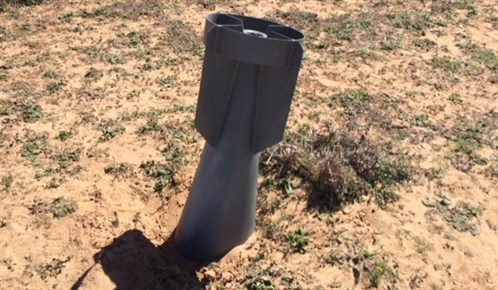16 March 2015
New Cluster Munition Use in Libya
Alarming evidence that banned weapon was used in at least two locations

Tail unit of an RBK-series cluster bomb outside Sirte, Libya. Numerous small craters from the detonation of submunitions were located nearby. © Human Rights Watch
Investigation results published on 15 March 2015 by CMC member Human Rights Watch confirm there is credible evidence that cluster munitions were used in Libya on at least two occasions since December 2014, in Sirte and Bin Jawad, with additional unverified reports of use on the Watiya front. Human Right Watch was not able to determine who has used cluster munitions on the basis of available evidence.
The Cluster Munition Coalition calls on Libyan authorities to investigate, to report publicly on their findings, and to ensure Libyan forces do not use the internationally banned weapon.
Cluster munitions have been banned on the basis of the disproportionate and indiscriminate harm they cause both at the time of attack and on the longer term. Strikes have a large footprint and leave behind duds that remain a fatal threat to anyone in the area long after use.
"Any use of cluster munitions by any actor under any circumstances is unacceptable," said Megan Burke, Director of the Cluster Munition Coalition. Use of the weapon in Syria, for instance, has already attracted strong condemnation by over 150 states.
Libya should join the 2008 Convention on Cluster Munitions that prohibits the use, stockpiling, production and transfer of the weapon, and that requires clearance of contaminated areas as well as comprehensive assistance to survivors, their families, and affected communities.
As detailed in the Cluster Munition Monitor, Libya is not known to have produced or exported cluster munitions, but in the past it imported and stockpiled the weapons. During the 2011 conflict, government forces loyal to Muammar Gaddafi used three different types of cluster munitions at various locations. For the safety of their own people, Libyan authorities should urgently ensure the destruction of any stockpiles of the indiscriminate weapon.
Representatives of Croatia, as President-Designate of the First Review Conference of the Convention on Cluster Munitions, noted on 16 March: "Croatia is deeply disturbed by the reported use of cluster munitions in the ongoing hostilities in Libya. These internationally banned weapons can cause tremendous human suffering, even years after their initial use. We call upon Libyan authorities to investigate the reports on cluster munitions use and to consider joining the Convention on Cluster Munitions."


